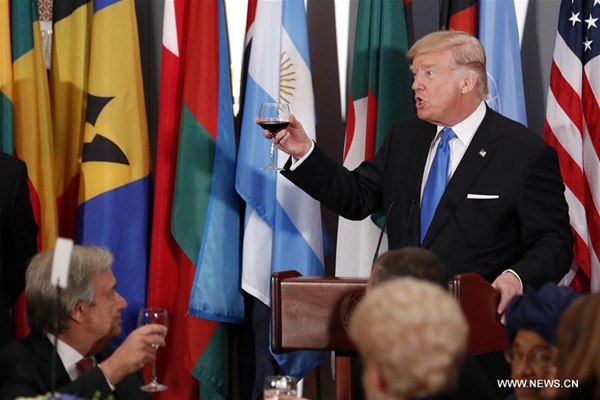Optimistic mood in the lead-up to Trump's China visit
- By Haifa Said
 0 Comment(s)
0 Comment(s) Print
Print E-mail China.org.cn, October 8, 2017
E-mail China.org.cn, October 8, 2017
|
|
|
U.S. President Donald Trump makes a toast during a Heads of States Luncheon hosted by the United Nations Secretary-General Antonio Guterres, at the UN headquarters in New York, Sept. 19, 2017. (Xinhua/Li Muzi) |
Despite continued underlying tensions between Beijing and Washington over a number of weighty issues, both sides seem keen to promote calm, allowing an upbeat tone to prevail for President Donald Trump's visit to China in November, following the invitation of Chinese counterpart Xi Jinping extended at their April Florida summit.
Many observers regard the visit as a stage set to redefine an increasingly testy U.S.-China relationship that has faced many complexities under both former and the current Washington administration.
During Barack Obama's term in office, China was criticized over its handling of territorial disputes in the South China Sea, practices targeting U.S. intellectual property and human rights issues.
Criticism of China has continued under the Trump administration, targeting Beijing's alleged "unfair" trade practices, intellectual property "violations" and "failure" to exert sufficient pressure on North Korea to halt its nuclear weapons and missiles programs.
The "dramatic downturn in relations" that many analysts expected to occur following the election of Trump, who had repeatedly dismissed China and described it in his campaign manifesto as an enemy of the U.S. and as a currency manipulator on day one of his administration, has been somewhat restrained.
Positive signs of optimism started to appear in the lead-up to, during and after the two-day summit that brought together Trump and Xi face to face for the first time in Florida.
Trump has since backed away from threats to challenge Beijing over Taiwan as well as on his "currency manipulation" threats.
Recently, during a meeting on the sidelines of the U.N. General Assembly, Chinese Foreign Minister Wang Yi told U.S. Vice President Mike Pence that both Beijing and Washington should "prepare well" to make the November summit a success in terms of creating the favorable conditions to boost strained bilateral relations.
While acknowledging the divergences, Chinese Premier Li Keqiang said at a meeting with U.S. Secretary of Commerce Wilbur Ross on September 25 that the two sides' common interests are greater than any differences, as the enormous benefits of their bilateral trade relations extend to the entire world.
"With China being the world's largest developing country and the U.S. being the world's biggest developed country, and both being the largest trading partners, I think it is fair to say that our common interests far outweigh our differences and divergences," Li said, while expressing the hope the U.S. would ease restrictions on Chinese companies' investments and high-tech exports.
The "very warmly welcome" Ross said he received during his visit to China further reflects the latter's "hopeful" view of Trump's expected trip.
Echoing this optimistic tone in China's official rhetoric, Ross told Chinese Premier Li Keqiang that he hopes the visit produce "some good deliverables."
In line with its conflict-avoidance policy, China looks forward to Trump's visit with willingness to "manage and control" disputes so as to bring into play the "huge potential for cooperation," as stated by Chinese Commerce Minister Zhong Shan at his meeting with Ross.
The optimistic mood that seems to have gained the upper hand since the Florida summit were highlighted by Secretary of State Rex Tillerson, who told reporters that "both the atmosphere [and] the chemistry between the two leaders was positive" at the summit, with "very frank" and "very positive" discussions held on issues including North Korea's weapons program, the South China Sea, cyber security and trade.
In his address to the recently held Bloomberg Global Business Forum in New York, China's Ambassador to the U.S. Cui Tiankai said Trump's upcoming visit to China "will help to settle trade and other disputes between the two countries and may pave the way for more American investment in a massive regional infrastructure initiative."
"The two sides will reach agreement on some of the issues we're dealing with and the prospects for mutual trade and mutual benefit will be better," Cui said, stressing that China does not "want to have any war - trade war, currency war or whatever war - with anybody, certainly not with the United States."
In fact, the "deliverables" mentioned by Ross may be achieved jointly in various areas, including a possible China-brokered meeting between Trump and North Korean President Kim Jong-un that could lead to a Korean peninsula peace treaty involving South Korea, Japan, China and Russia.
On trade and intellectual property issues, China could work on welcoming more American goods and services, while the U.S., in return, could welcome more Chinese investments, provided they generate sufficient American jobs.
Trust-building measures and joint maritime activities could also be another deliverable to prevent escalation of the critical South China Sea issue.
Xi's massive Belt and Road Initiative may also be another flashpoint of cooperation where Trump could highlight U.S. business interests in the projects of the "win-win" cooperation model.
Haifa Said is chief editor of Syria Arab News Agency.
Opinion articles reflect the views of their authors, not necessarily those of China.org.cn.







Go to Forum >>0 Comment(s)